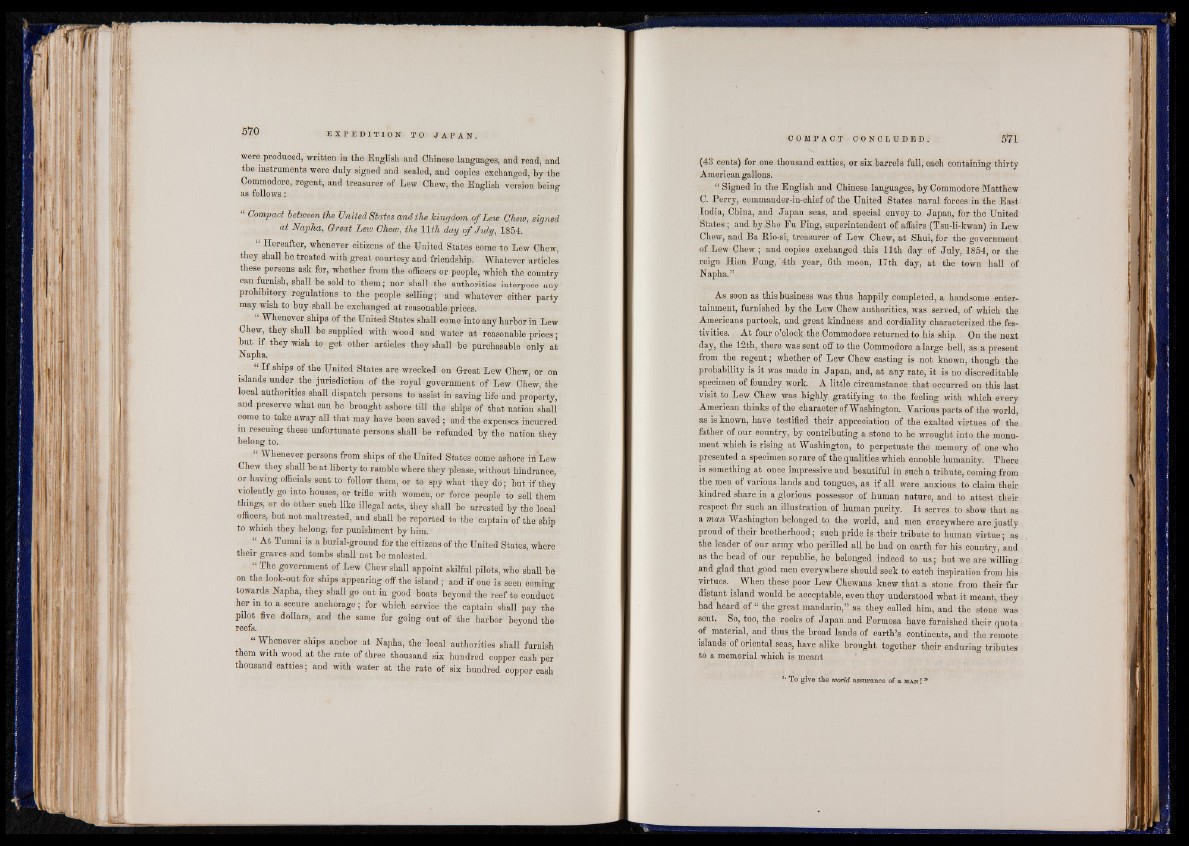
were produced, written in the English and Chinese languages, and read, and
the instruments were duly signed and sealed, and copies exchanged, by the
Commodore, regent, and treasurer of Lew Chew, the English version being
as follows: 6
Compact between the Un ited States and the kingdom o f Lew Chew, signed
at Napha, Great Lew Chew, the 11th day o f July, 1854.
“ Hereafter, whenever citizens of the United States come to Lew Chew,
they shall be treated with great courtesy and friendship. Whatever articles
these persons ask for, whether from the officers or people, which the country
can furnish, shall be sold to them; nor shall the authorities interpose any
prohibitory regulations to the people sellingf and whatever either party
may wish to buy shall be exchanged at reasonable prices.
Whenever ships of the United States shall come into any harbor in Lew
Chew, they shall be supplied with wood and water at reasonable prices;
but if they wish to get other articles they shall be purchasable only at
Napha.
I f ships of the United States are wrecked on Great Lew Chew, or on
islands under the jurisdiction of the royal government of Lew Chew, the
local authorities shall dispatch persons to assist in saving life and property,
and preserve what can be brought ashore till the ships of that nation shall
come to take away all that may have been saved; and the expenses incurred
in rescuing these unfortunate persons shall be refunded by the nation they
belong to.
Whenever persons from ships of the United States come ashore in Lew
Chew they shall be at liberty to ramble where they please, without hindrance,
or having officials sent to follow them, or to spy what they do; but if they
violently go into houses, or trifle with women, or force people to sell them
things, or do other such like illegal acts, they shall be arrested by the local
officers, but not maltreated, and shall be reported to the captain of the ship
to which they belong, for punishment by him.
“ At Tumai is a burial-ground for the citizens of the United States, where
their graves and tombs shall not be molested.
“ The government of Lew Chew shall appoint skilful pilots, who shall be
on the look-out for ships appearing off the island; and if one is seen coming
towards Napha, they shall go out in good boats beyond the reef to conduct
her in to a secure anchorage; for which service the captain shall pay the
pilot five dollars, and the same for going out of the harbor beyond the
reefs.
“ Whenever ships anchor at Napha, the local authorities shall furnish
them with wood at the rate of three thousand six hundred copper cash per
thousand catties; and with water at the rate of six hundred copper cash
(43 cents) for one thousand catties, or six barrels full, each containing thirty
American gallons.
“ Signed in the English and Chinese languages, by Commodore Matthew
C. Perry, commander-in-chief of the United States naval forces in the East
India, China, and Japan seas, and special envoy to Japan, for the United
States; and by.Sho Eu Eing, superintendent of affairs (Tsu-li-kwan) in Lew
Chew, and Ba Rio-si, treasurer of Lew Chew, at Shui, for the government
of Lew Chew ; and copies exchanged this 11th day of July, 1854, or the
reign Hien Eung, 4th year, 6th moon, 17th day, at the town hall of
Napha.”
As soon as this business was thus happily completed, a handsome entertainment,
furnished by the Lew Chew authorities, was served, of which the
Americans partook, and great kindness and cordiality characterized the festivities.
At four o’clock the Commodore returned to his ship. On the next
day, the 12th, there was sent off to the Commqdore a large bell, as a present
from the regent; whether of Lew Chew casting is not known, though the
probability is it was made in Japan, and, at any rate, it is no discreditable
specimen of foundry work. A little circumstance that occurred on this last
visit to Lew Chew was highly gratifying to the feeling with which every
American thinks of the character of Washington. Various parts of the world,
as is known, have testified their appreciation of the exalted virtues of the
father of our country, by contributing a stone to be wrought into the monument
which is rising at Washington, to perpetuate the memory of one who
presented a specimen so rare of the qualities which ennoble humanity. There
is something at once impressive and beautiful in such a tribute, coming from
the men of various lands and tongues, as if all were anxious to claim their
kindred share in a glorious possessor of human nature, and to attest their
respect fer such an illustration of human purity. I t serves to show that as
a man Washington belonged.to the world, and men everywhere are justly
proud of their brotherhood; such pride is their tribute to human virtue; as
the leader of our army who perilled all he had on earth for his country, and
as the head of our republic, he belonged indeed to u s; but we are willing
and glad that good men everywhere should seek to catch inspiration from his
virtues. When these poor Lew Chewans knew that a stone from their far
distant island would be acceptable, even they understood what it meant, they
had heard of “ the great mandarin,” as they called him, and the stone was
sent. So, too, the rocks of Japan and Eormosa have furnished their quota
of material, and thus the broad lands of earth’s continents, and the remote
islands of oriental seas, have alike brought together their enduring tributes
to a memorial which is meant
gj To give the world assurance of a man ! ”